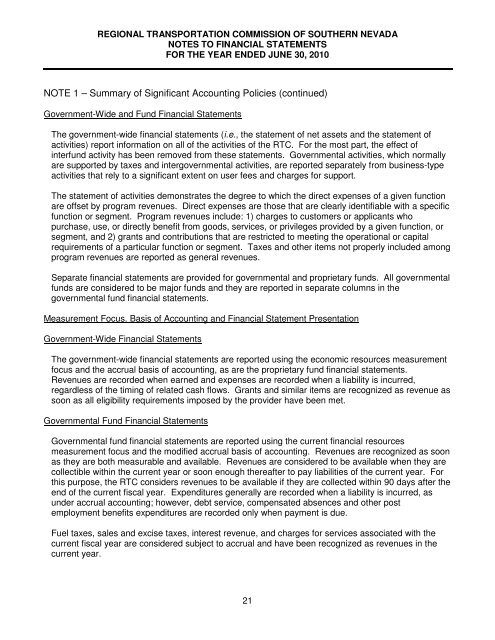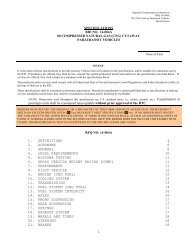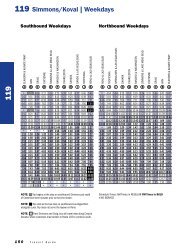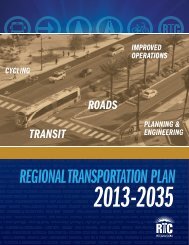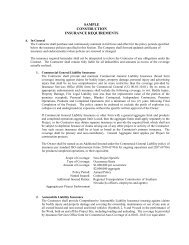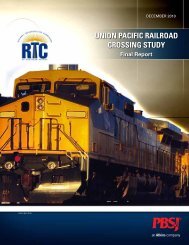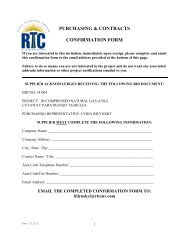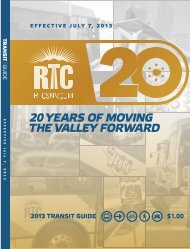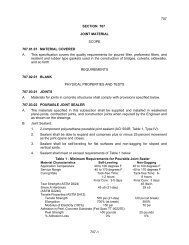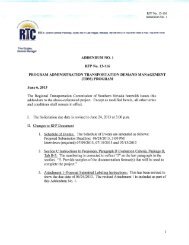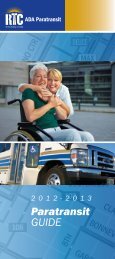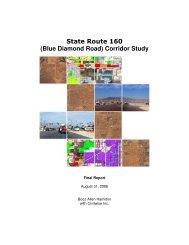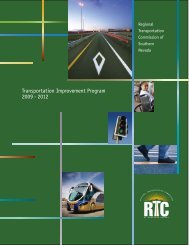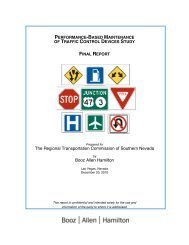2010 Component Unit Financial Statements - Regional ...
2010 Component Unit Financial Statements - Regional ...
2010 Component Unit Financial Statements - Regional ...
Create successful ePaper yourself
Turn your PDF publications into a flip-book with our unique Google optimized e-Paper software.
REGIONAL TRANSPORTATION COMMISSION OF SOUTHERN NEVADA<br />
NOTES TO FINANCIAL STATEMENTS<br />
FOR THE YEAR ENDED JUNE 30, <strong>2010</strong><br />
NOTE 1 – Summary of Significant Accounting Policies (continued)<br />
Government-Wide and Fund <strong>Financial</strong> <strong>Statements</strong><br />
The government-wide financial statements (i.e., the statement of net assets and the statement of<br />
activities) report information on all of the activities of the RTC. For the most part, the effect of<br />
interfund activity has been removed from these statements. Governmental activities, which normally<br />
are supported by taxes and intergovernmental activities, are reported separately from business-type<br />
activities that rely to a significant extent on user fees and charges for support.<br />
The statement of activities demonstrates the degree to which the direct expenses of a given function<br />
are offset by program revenues. Direct expenses are those that are clearly identifiable with a specific<br />
function or segment. Program revenues include: 1) charges to customers or applicants who<br />
purchase, use, or directly benefit from goods, services, or privileges provided by a given function, or<br />
segment, and 2) grants and contributions that are restricted to meeting the operational or capital<br />
requirements of a particular function or segment. Taxes and other items not properly included among<br />
program revenues are reported as general revenues.<br />
Separate financial statements are provided for governmental and proprietary funds. All governmental<br />
funds are considered to be major funds and they are reported in separate columns in the<br />
governmental fund financial statements.<br />
Measurement Focus, Basis of Accounting and <strong>Financial</strong> Statement Presentation<br />
Government-Wide <strong>Financial</strong> <strong>Statements</strong><br />
The government-wide financial statements are reported using the economic resources measurement<br />
focus and the accrual basis of accounting, as are the proprietary fund financial statements.<br />
Revenues are recorded when earned and expenses are recorded when a liability is incurred,<br />
regardless of the timing of related cash flows. Grants and similar items are recognized as revenue as<br />
soon as all eligibility requirements imposed by the provider have been met.<br />
Governmental Fund <strong>Financial</strong> <strong>Statements</strong><br />
Governmental fund financial statements are reported using the current financial resources<br />
measurement focus and the modified accrual basis of accounting. Revenues are recognized as soon<br />
as they are both measurable and available. Revenues are considered to be available when they are<br />
collectible within the current year or soon enough thereafter to pay liabilities of the current year. For<br />
this purpose, the RTC considers revenues to be available if they are collected within 90 days after the<br />
end of the current fiscal year. Expenditures generally are recorded when a liability is incurred, as<br />
under accrual accounting; however, debt service, compensated absences and other post<br />
employment benefits expenditures are recorded only when payment is due.<br />
Fuel taxes, sales and excise taxes, interest revenue, and charges for services associated with the<br />
current fiscal year are considered subject to accrual and have been recognized as revenues in the<br />
current year.<br />
21


